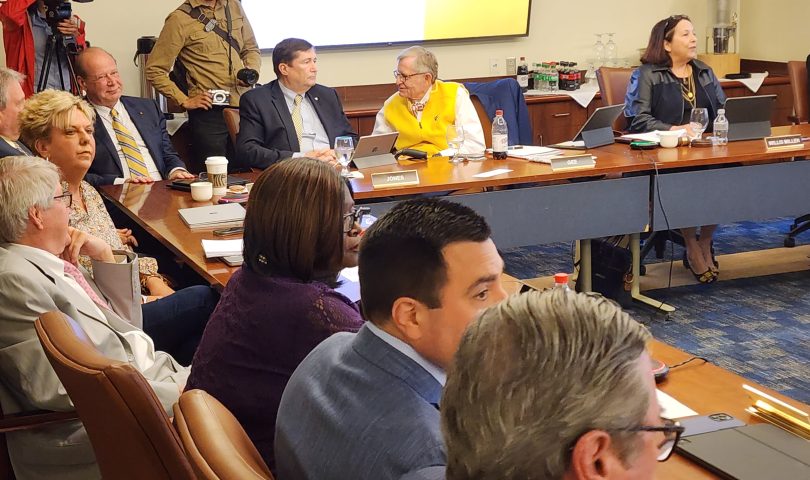MORGANTOWN – WVU President Gordon Gee talked with The Dominion Post Editorial Board this week about the Academic Transformation process. Here are some of the highlights.
A frequent criticism of the process – with the resulting cuts in faculty and majors – is that it hasn’t been transparent. Gee denies that.
“They’re just wrong,” he said. He’s been talking about it every year since he returned to WVU in 2014. “What happens in academic life is people don’t listen because they think the world is always going to be the same. … We have an entitlement mentality.”
As the process proceeded, “I don’t think that people believed that as we were going through this process that we would actually implement it. … There are so many false narratives out there. I think fear overcomes facts. This is scary.”
WVU emerged from the pandemic, he said, with the $45 million structural deficit – which is different from a one-time deficit and occurs and builds over time. He called it “too many people not teaching enough students,” as enrollment fell from 33,000 to the current 25,384 at all three campuses but faculty and programs remained the same.
But the deficit was just $45 million of a $1.3 billion budget. “We have not had a financial crisis; we do not have a financial crisis. We will have one if we did not do what we are doing. … I think that was a wise decision on our part.”
Although he’d hoped enrollment would reach 40,000, he said, they never budgeted on that basis.
The transformation was built on three principles: being transparent, being fact oriented (including using rpk Group); and moving fast. “The faster you get these issues behind you, then the faster you can start reinventing and investing.”
Despite transformation being part of the conversation since 2014, we asked if the accelerated program portfolio review may have exacerbated bad feelings across campus.
He said, “I think if we could have done everything exactly the way we’d like to have, I’d have preferred to have more time to get people acclimated to it. In my view, we didn’t have the time. We needed to get the deficit behind us as quickly as we could. We need to move from threat to thrive.”
Gee talked about the erosion of confidence in higher education in general. “Universities have spent a lot of time telling the American public what they should think. The American public is now telling us what they want us to do.” The public thinks universities are too expensive, overextended, not investing in the right things, not getting the right kinds of jobs for their students, he said. “Universities have to change with society.”
Gee wants WVU to focus on certain new investments: neuroscience, energy, biometrics, astrophysics, health science, education, Appalachian arts, computational sciences.
“The issues of choices and partnership are going to be the real issue for higher education coming forward,” he said. For WVU that means looking at collaborations with other Big 12 universities to start sharing resources, rather than trying to be everything to everybody.
A hefty tuition hike to make up the deficit is not in the cards, he said. “Parents would riot.” And the Legislature would balk. “We have to deal with the cards we’ve been given.”
While WVU’s pain is gaining national attention, WVU isn’t unique, he said. “We’re on the front end of the spear. What we’re doing now is what a number of institutions are going to be doing over the next two to three years.”
And people don’t remember that the trimming started on the non-academic side, he said. Senior administrators cut their own salaries. The athletic department salaries were cut by 10%. Some vice presidents have taken on several jobs as other VPs retired or were let go.
And staff – classified and non-classified – saw their numbers cut by 509 positions since 2015, he said.
Gee said he was intending to retire at the end of his current contract, but the Board of Governors asked him to stay on another year – through June 30, 2025, to see through this process. “This is not a time to bring in a new person in the midst of these changes we are making.”
While acknowledging the current pain, he believes transformation is necessary, he said. “I’m very committed to making certain that the university will be strong and better at the end of this process.”
Email: dbeard@dominionpost.com




